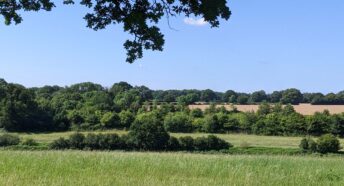No Time for TEA (Thames Estuary Airport!)
Sir Howard Davis’s Airports Commission has finally announced that the idea of a wholly new hub airport in the Thames Estuary will no longer be considered a possibility. We have to breathe a sigh of relief at this, since the enormous environmental damage, financial cost and business risk of such an enterprise have finally been clearly and damningly recognised.
Given the resounding pounding that the idea of a new ‘Boris Island’ has received this morning does give us cause to consider why so much public money has been unnecessarily spent in extending the work of the Commission in hammering the last few nails into this particular coffin. Nevertheless, we must not allow ourselves to be distracted from the fact that the focus for airport capacity expansion is now firmly on either Gatwick or Heathrow.
CPRE Kent remains convinced – along with other Non-Governmental Organisations – that the case for expansion is far from clear-cut. We contend that adequate airport capacity already exists; it is not passenger numbers but flight numbers that are the key parameter. Flight numbers have not increased in line with passenger numbers, since aircraft now carry more passengers per flight. Sensible management of transport policy, making best use of existing alternative (and less environmentally damaging) routes, could free up significant runway space (the south east has astonishingly good rail connections to mainland Europe, yet Heathrow alone carries over 10 flights per day to Paris alone). Let’s make sensible use of the runway space that already exists – and yes, even at Manston, provided it can be operated under a sensible planning regime that prevents the erosion of night flight controls – before we rush to increase pollution, sacrifice homes, blight lives and lose green spaces.
HN
2nd September 2014
- A number of important documents have yet to emerge. For example, a rigorous transport plan and a finalised air-quality assessment. The latter is critical given that allocations at Teynham will feed extra traffic into AQMAs.
- There seems to be no coherent plan for infrastructure delivery – a key component of the plan given the allocations being proposed near the already crowded Junction 7.
- There seems to have been little or no cooperation with neighbouring boroughs or even parish councils within Swale itself.
The removal of a second consultation might have been understandable if this final version of the plan were similar to that being talked about at the beginning of the consultation process. It is, however, radically different in the following ways:
- There has been a major shift in the balance of housing allocations, away from the west of the borough over to the east, especially around the historic town of Faversham. This is a move that raises many concerns.
- A new large allocation, with accompanying A2 bypass, has appeared around Teynham and Lynsted, to which we are objecting.
- Housing allocations in the AONB around Neames Forstal that were judged “unsuitable” by the council’s own officers have now appeared as part of the housing numbers.
- Most of the housing allocations being proposed are on greenfield sites, many of them on Grade 1 agricultural land – a point to which we are strongly objecting.
Concerns about the rush to submit the plan
The haste with which the plan is being prepared is especially worrying given the concentration of housing in Faversham. If the town is to take a large amount of new housing, it is imperative that the policies concerning the area are carefully worked out to preserve, as far as possible, the unique nature of the town. The rush to submit the plan is likely to prove detrimental.
As Swale does not have a five-year land housing supply, it is open to speculative development proposals, many of which would run counter to the ideas contained in the current plan. Some are already appearing. This is a common situation, and one that, doubtless, is a reason behind Swale’s haste.
Our overriding fear, however, is that this emphasis on haste is ultimately going to prove counterproductive. This is because it is our view that the plan, in its current form, is unlikely to pass independent examination. We are urging Swale to listen to and act upon the comments being made about the plan and to return the plan to the council with appropriate modifications before submitting it to the Secretary of State.
Essentially, this means treating the current consultation not as the final one but as the ‘lost’ second consultation.
The consultation ends on Friday 30 April and we strongly urge residents to make their opinions known if they have not already done so.
Further information








